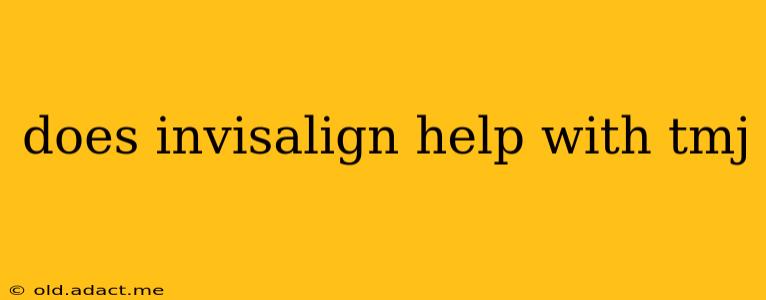Temporomandibular joint (TMJ) disorders are a common source of facial pain and discomfort. Many people wonder if Invisalign, a popular orthodontic treatment, can alleviate TMJ symptoms. The answer isn't a simple yes or no, and understanding the complex relationship between Invisalign and TMJ requires a nuanced approach. While Invisalign itself doesn't directly treat TMJ, it can potentially help in certain situations, and in others, it could even exacerbate existing issues. Let's delve into the details.
Can Invisalign Worsen TMJ Symptoms?
This is a crucial question. While Invisalign aims to straighten teeth, the process of moving teeth can, in some cases, put stress on the jaw joint. This is especially true if there are pre-existing TMJ issues. The pressure from the aligners and the gradual shifting of teeth could potentially worsen existing symptoms like jaw pain, clicking, or headaches. Therefore, it's essential to discuss any TMJ concerns with your orthodontist before starting Invisalign treatment.
How Can Invisalign Help with TMJ? (In Certain Cases)
In specific circumstances, Invisalign can indirectly contribute to TMJ relief. If misaligned teeth are contributing to TMJ problems (by causing an uneven bite or muscle strain), correcting the alignment through Invisalign might alleviate some of the pressure on the jaw joint. This is because a proper bite can improve the jaw's functionality and reduce unnecessary stress on the joint. However, this is not a guaranteed outcome, and it's crucial to have a proper diagnosis to determine if this approach is suitable.
What are the risks of Invisalign and TMJ?
The primary risk is the exacerbation of existing TMJ symptoms. The constant pressure of the aligners and the gradual tooth movement can aggravate an already strained joint. This can lead to increased pain, inflammation, and discomfort. It's also possible that the alignment changes brought about by Invisalign might inadvertently create a new bite issue, ultimately worsening TMJ.
Is Invisalign a TMJ Treatment?
No, Invisalign is not a TMJ treatment. It's an orthodontic treatment designed to straighten teeth. While it might indirectly help some individuals with TMJ-related issues caused by malocclusion, it's not a replacement for proper TMJ diagnosis and treatment by a specialist, like an oral surgeon or a physical therapist specializing in TMJ disorders.
What if I have TMJ and want straighter teeth?
If you have TMJ and desire straighter teeth, open communication with both your orthodontist and a TMJ specialist is paramount. They can work together to assess your specific situation and determine the best course of action. This might involve managing your TMJ symptoms first, followed by Invisalign, or it might mean exploring alternative orthodontic options that place less stress on the jaw joint.
What are some alternative treatments for TMJ?
Many treatment options exist for TMJ disorders, ranging from conservative approaches like pain relievers, physical therapy (including exercises for jaw muscles), and bite splints to more invasive procedures. A healthcare professional specializing in TMJ will determine the most suitable treatment based on individual needs.
Should I get Invisalign if I have TMJ?
This decision requires careful consideration and consultation with healthcare professionals. If your TMJ symptoms are mild and your orthodontist feels that the risk of exacerbation is low, Invisalign might be a viable option. However, if your TMJ is severe or you have a history of significant jaw problems, other orthodontic options or alternative treatments should be explored. Prioritizing your jaw health and seeking professional advice before starting any treatment is crucial.
By understanding the potential benefits and risks, and engaging in open dialogue with your healthcare team, you can make an informed decision about whether Invisalign is the right choice for you, even if you have TMJ. Always remember that personalized advice from qualified professionals is essential.
